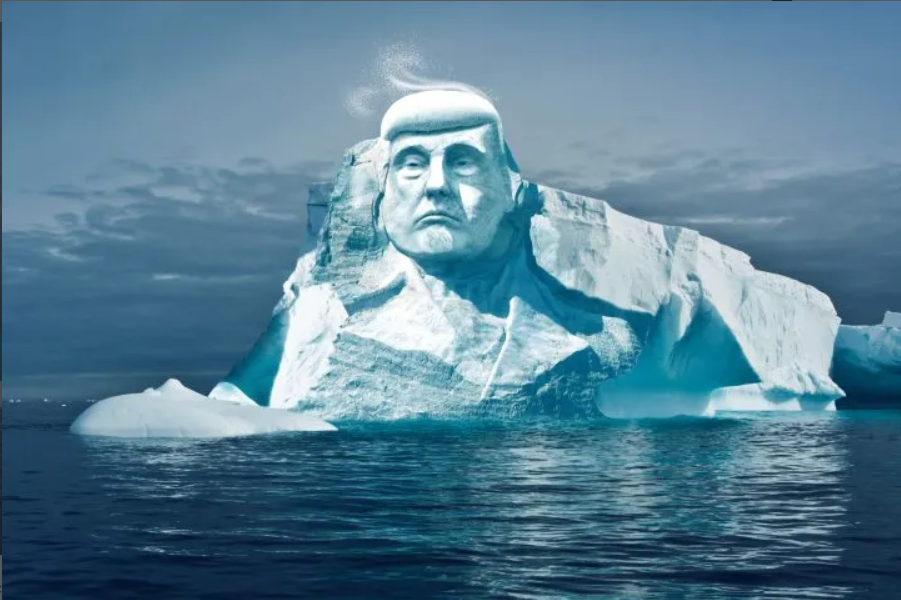We need your help! Join our growing army and click here to subscribe to ad-free Revolver. Or give a one-time or recurring donation during this critical time.
One of the zanier moments of Donald Trump’s memorable presidency came when he broached the idea of becoming the first U.S. president to meaningfully expand U.S. territory since William McKinley annexed Hawaii in 1898. Why, Trump asked his advisers in 2019, shouldn’t the U.S. pony up to take Greenland off Denmark’s hands? Like so many of Trump’s off-the-wall notions, the idea was mocked in the papers and ridiculed on late-night TV, but it was actually brilliant. In Denmark’s hands, Greenland is a sad relic of a former overseas empire, occupied by about 50,000 Inuit who suffer from the world’s highest suicide rate and are largely dependent on Denmark’s welfare state for survival. In America’s hands, Greenland would greatly increase America’s strategic presence in the Arctic region while also giving it new, largely unexploited reserves of important natural resources, which the U.S. has far more capacity to develop than Denmark.
Sadly, the Danes aren’t selling. Too bad.
But the dream of a new, greater America need not die there. Because, in fact, there is a vast piece of strategic real estate ripe for the taking that need not be bought or conquered by anyone. Yes, you’re thinking correctly: After he successfully reclaims the White House, one of Donald Trump’s objectives should be to expand America’s borders and her economic might by annexing Antarctica.
Wait, what?

No, we’re serious.
Is this some wacky meme idea? Well, obviously, yeah. But at the same time, we are quite sincere. The list of reasons to colonize Antarctica is long, and the reasons not to do it are surprisingly thin.
Antarctica Is Full of Unexploited Natural Resources
At the risk of stating the incredibly obvious, Antarctica is a fully-sized continent. At 5.5 million square miles, it’s larger than both Australia and Europe. It’s 88% as large as Russia. That means a continent’s worth of untapped natural resources—oil, gas, gold, copper, uranium, you name it—plus even more in the continent’s almost totally unexploited coastal waters.
Right now, these resources are not economical to seek out and develop, so the continent appears useless. But one day, that will change.
In fact, there’s even precedent for such a change in a current U.S. state: Alaska. When William Seward masterminded the territory’s purchase in 1867, support for it was grounded mostly in Manifest Destiny and the potential for increased U.S. trade with Asia. Only thirty years after the purchase, with the Klondike Gold Rush, did Alaska become attractive for economic exploitation in its own right, and it took 110 years for the Prudhoe Bay oil field (the largest in North America) to enter development. The payoff on Seward’s purchase was long, but it indisputably has been to America’s gargantuan benefit.
Antarctica Is Neutral Because of an Obsolete Treaty
So, more than a century after the race to the South Pole, why does almost ten percent of the Earth’s land area remain the exclusive domain of a few thousand science nerds? The answer is the Antarctic Treaty and its many follow-up agreements.
The Antarctic Treaty dates back to 1959, when it was negotiated among 12 nations with existing or potential claims to the Antarctic landmass. The treaty banned territorial claims, military operations, nuclear testing, and economic exploitation below 60°S latitude—in essence, for the entirety of Antarctica and its outlying islands.
At the time, the treaty was motivated by recurring conflicts between potential Antarctic powers and by the fear that the Soviet Union would muscle its way into the Antarctic theater.
If Donald Trump has a pet peeve as a politician, it’s bad deals—and worst of all, bad deals that stick around for no discernible reason. When the U.S. proposed making Antarctica a neutral zone, it was by far the country with the greatest ability to develop Antarctica. America remains as such today, but in a far less dominant position than 60 years ago. Today, the Cold War is over, and both China and Russia flagrantly lay the groundwork for economic expansion in Antarctica, while the U.S. does nothing.
Antarctica’s Resources Are Hard to Reach… But Not THAT Hard to Reach
Antarctica is certainly an unhospitable place. Temperatures in the interior routinely drop below -100 degrees in winter, and most of the continent literally never reaches above freezing temperatures. The continent’s original landmass is buried beneath a mass of ice averaging more than a mile in thickness. Merely finding, let alone harvesting, the natural resources of Antarctica’s interior would be enormously difficult and expensive.
But consider that, at this moment, the world dreams of building bases on the surfaces of the moon and Mars. An asteroid-mining startup has collected enough investor cash to launch a probe aboard a SpaceX rocket next year. Sure, drilling a hole through a mile of ice is hard, but it’s not as hard or expensive as building a literal moon base. Exploiting Antarctica will become economically viable long before it becomes profitable to develop a different planet.
And in fact, the two are related. Already, Antarctic stations are used to train astronauts and study survival in harsh environments. If America takes the lead in seriously colonizing Antarctica, it will also be setting the stage to be the leading technical player in taking humanity to the stars.
Antarctica Will, Eventually, Be Colonized
This is simply common sense. For the moment and in the foreseeable future, life on Earth depends on the location, extraction, and use of finite natural resources, whether petroleum, gas, or minerals. As the most easily-obtained forms of those resources are located and used, prices rise, and as prices rise, new sources of resources become viable. Right now, digging up Antarctica’s goodies isn’t needed. But someday—not tomorrow or next year, but someday—getting at Antarctica’s resources will be economically viable, and sometime after there, it will be necessary. And when that necessity arrives, there are only two candidates who are able to cash in. It will either be the military and political hegemon of that future date, or it will be the country that secured Antarctica’s territory far in the past and established its claim to it. America has every reason to make itself the latter country now, rather than simply hoping it is still a global superpower 100 years hence.
Today, Russia sorely regrets selling Alaska to America on the cheap; America would be feeling the same pangs of regret if it had turned down Russia’s offer a century and a half ago. How much might America regret not taking the lion’s share of the world’s last great untouched resource stockpile while it was there for the taking?
Now Is the Time
Nobody who reads us needs us to tell you that America’s global standing isn’t what it once was. America’s economic and military supremacy are more tenuous than at any time in living memory. One more nasty economic shock could send America into a freefall, forcing massive cuts to military spending and a dramatic pullback of America’s global presence.
But in Antarctica, at least, America’s preeminence is still unchallenged. Of the roughly 4,400 personnel stationed across Antarctica during the summer, more than a quarter are Americans. America operates by far the largest Antarctic facility (McMurdo Station) and the only Antarctic base at the South Pole (Amundsen-Scott).
At this moment, China’s presence in Antarctica remains small but is growing rapidly, with a fifth base under construction in early 2023. According to Australia, China is “conduct[ing] illegal military activities in Antarctica, is building up the case for a territorial claim and is engaging in mineral exploitation.” Russia is doing its own economic exploration of Antarctica, which has caused some alarm among South Pole enthusiasts.
As currently written, the Antarctic Treaty is supposed to be up for modification and review in 2048. But based on current trajectories, would America rather have that review take place then, when China and Russia will have had another quarter-century to develop their presence? Of course not. America’s relative power in Antarctica is declining, so we should act while our overall power remains dominant.
Diplomatic Horse-Trading
Of course, if America tries to devour all of Antarctica, it’s sure to raise hackles of protest from other nations. The obvious fix, though, is something near and dear to President Trump’s heart: Make a deal!
Right now, seven countries claim some part of Antarctica: Chile, Argentina, Britain, France, Norway, Australia, and New Zealand. The U.S. and Russia, meanwhile, have in the past reserved the right to make their own territorial claims if Antarctica were to actually start being carved up.
Imagine if the Trump administration dangled recognition of a sizable Russian claim in the Antarctic in return for a more favorable resolution of the Ukraine conflict. Or imagine if the U.S. gave China a prominent seat at the table in return for concessions on trade or on the Taiwan question. Alternatively, America could use Antarctic turf as a tool for rewarding close allies on the international stage and keeping them aligned on America’s side against her rivals.
As Trump understands, the secret to success is to be bold. Whatever the claims of other countries, America still has by far the greatest capacity for military power projection into Antarctica’s frosty interior. Antarctica is in fact the perfect place for the U.S. military—a totally depopulated battleground, free of all the civilians, insurgents, and complex social settings that have made America’s 21st century wars such a mess.
Behind America itself, the country with the largest presence on the seventh continent is Argentina, which happens to have just elected Javier Milei as its president. If Argentina were to ever have a leader sympathetic to privatizing and developing Antarctica, it’s this one, and if Argentina were to ever have a government worth working with and rewarding, it’s now.
It Would Be Great
Any child who reads a book on the Roman Empire will soon run into a map of the empire. Without exception, that map will show the empire as it was at its point of greatest territorial extent, upon the death of the emperor Trajan in 117 AD.
On a basic level, all people know that strong, vital nations grow while weak ones contract. We grasp, at a primal level, that when a state peaks in size, it has also peaked in power.
If America annexed all or the vast majority of Antarctica, it would overnight become the world’s largest state. Yet it would do so without resorting to mere conquest. Instead, America would be taking the lead in settling and mastering the last true frontier on planet Earth.
It would be an act worthy of 20th-century America, the most innovative country to have ever existed in human history. It would be making America great—or rather, Making America Great Again.
SUPPORT REVOLVER — DONATE — SUBSCRIBE — NEWSFEED — GAB — GETTR — TRUTH SOCIAL — TWITTER






Join the Discussion